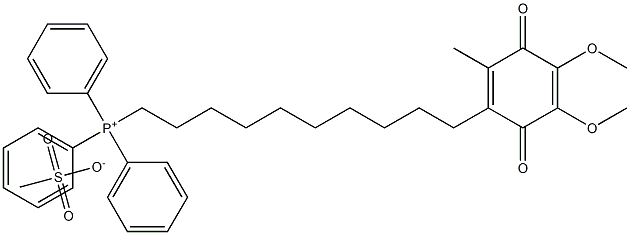845959-50-4
 845959-50-4 結(jié)構(gòu)式
845959-50-4 結(jié)構(gòu)式
基本信息
MitoQ mesylate
MitoQ10 mesylate
Mitoquinol Mesylate
Mitoquinone mesylate
Mitoquinone mesylate, ethanol solution
Mitoquinone mesylate (Mitoquinone methanesulfonate
10-(4,5-dimethoxy-2-methyl-3,6-dioxocyclohexa-1,4-dien-1-yl)decyl-triphenylphosphanium,methanesulfonate
物理化學(xué)性質(zhì)
| 報(bào)價(jià)日期 | 產(chǎn)品編號(hào) | 產(chǎn)品名稱 | CAS號(hào) | 包裝 | 價(jià)格 |
| 2025/02/08 | HY-100116A | 米托蒽醌甲磺酸鹽 Mitoquinone mesylate | 845959-50-4 | 5mg | 1100元 |
| 2025/02/08 | HY-100116A | 米托蒽醌甲磺酸鹽 Mitoquinone mesylate | 845959-50-4 | 10mM * 1mLin DMSO | 1643元 |
| 2025/02/08 | HY-100116A | 米托蒽醌甲磺酸鹽 Mitoquinone mesylate | 845959-50-4 | 10mg | 1850元 |
常見(jiàn)問(wèn)題列表
| Target | Value |
|
mitochondria
() | |
|
ROS
() |
Mitoquinone (MitoQ) is a mitochondria-targeted antioxidant.The optimal doses for Mitoquinone (MitoQ) and DecylTPP treatment are selected from dose-response experiments during 4-h cold storage (CS). The potential protective benefits of Mitoquinone treatment against CS injury are tested initially using MitoSOX Red, a mitochondrial-targeted fluorescent dye that measures mitochondrial superoxide generation. Normal rat kidney (NRK) cells exposed to CS result in a ~2-fold increase in fluorescence due to mitochondrial superoxide compared with untreated cells. Mitoquinone offers significant protection against CS-induced mitochondrial superoxide generation; whereas the control compound DecylTPP does not offer any protection. Mitoquinone treatment markedly decreases mitochondrial superoxide generation, whereas kidneys treated with DecylTPP have comparable levels of mitochondrial superoxide to kidneys exposed to CS alone.
Mitoquinone (MitoQ) treatment significantly reduces pancreatic oedema and neutrophil infiltration. MitoQ dose-dependently increases serum amylase with an approximate doubling at the higher dose. MitoQ treatment nearly doubles lung MPO activity induced by Caerulein with a significant increase of serum IL-6 levels also evident at 10?mg/kg (dose 1).